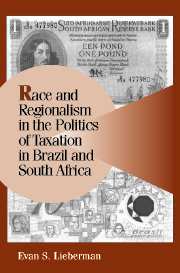Book contents
- Frontmatter
- Contents
- List of Figures and Tables
- Acknowledgments
- Abbreviations
- 1 THE POLITICS OF TAXATION
- 2 THE TAX STATE IN COMPARATIVE PERSPECTIVE
- 3 CRITICAL JUNCTURE: DEFINING NATIONAL POLITICAL COMMUNITY
- 4 THE RISE OF THE MODERN TAX STATE IN BRAZIL AND SOUTH AFRICA
- 5 SHADOWS OF THE PAST: TAX REFORM IN AN ERA OF GLOBALIZATION AND DEMOCRATIZATION
- 6 POLITICAL COMMUNITY AND TAXATION BEYOND BRAZIL AND SOUTH AFRICA
- 7 CONCLUSION
- APPENDIX: COMPARATIVE-HISTORICAL ANALYSIS
- References
- Index
- Titles in the series
7 - CONCLUSION
Published online by Cambridge University Press: 22 December 2009
- Frontmatter
- Contents
- List of Figures and Tables
- Acknowledgments
- Abbreviations
- 1 THE POLITICS OF TAXATION
- 2 THE TAX STATE IN COMPARATIVE PERSPECTIVE
- 3 CRITICAL JUNCTURE: DEFINING NATIONAL POLITICAL COMMUNITY
- 4 THE RISE OF THE MODERN TAX STATE IN BRAZIL AND SOUTH AFRICA
- 5 SHADOWS OF THE PAST: TAX REFORM IN AN ERA OF GLOBALIZATION AND DEMOCRATIZATION
- 6 POLITICAL COMMUNITY AND TAXATION BEYOND BRAZIL AND SOUTH AFRICA
- 7 CONCLUSION
- APPENDIX: COMPARATIVE-HISTORICAL ANALYSIS
- References
- Index
- Titles in the series
Summary
As George Tsebelis points out, the value of social scientific explanations may best be measured by the degree to which they force us to re-evaluate our prior beliefs. On this score, scholars of South African politics could reasonably argue that it is hardly surprising to discover that race was central to understanding political dynamics in that country. Similarly, most scholars of Brazilian politics would immediately recognize federalism as a defining feature of political life in Brazil. So what aspects of the analysis and evidence presented in the previous chapters stand in the face of conventional wisdom about politics in these two countries, let alone at a more general, theoretical level? What new understanding have we gained with respect to the process of state-building, and particularly the development of national tax systems, by exploring the implications of the political community model? In fact, many of the conclusions drawn from the analysis and evidence presented above do imply the need to re-evaluate prior beliefs about a number of relationships. With these insights, we can explore the implications – albeit in a highly speculative manner – for the future of these two countries, and a range of additional questions and concerns relevant to other political and policy problems and in other world areas.
More than anything, the explanation of tax state building presented in this book revealed the surprising causal relationship between the politics of race and regionalism on the one hand, and the development of tax policy and tax administration on the other.
- Type
- Chapter
- Information
- Publisher: Cambridge University PressPrint publication year: 2003

